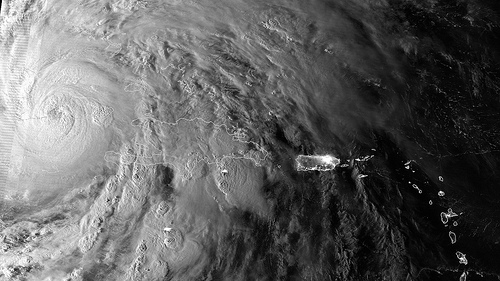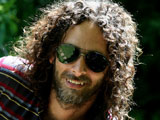Cuban Civil Society V. Sandy
by Orlando Luis Pardo Lazo and translated by Alex Higson / November 12, 2012 / 1 Comment
The case for hope after a natural disaster

Satellite image of Hurricane Sandy making landfall in Cuba. Photo: NASA Earth Observatory
Hurricane Sandy has devastated the east of Cuba. In just a few hours on October 24 the cities of Santiago de Cuba, Guantánamo, and Holguín were transformed into a battle scene.
Tens of thousands of buildings collapsed, including residential and state buildings, along with colonial and newly-constructed edifices. Telephone service was interrupted immediately and electricity was cut off, since the Island still uses overhead power-lines rather than running the cables underground. Three Cuban provinces were almost completely shut off from the rest of the country.

- Is it worth-while to focus on the last images and letters coming from
the inside of the last living utopia on Earth? Is Cuba by now a
contemporary country or just another old-fashioned delusion in the middle
of Nowhere-America? A Cold-War Northtalgia maybe? Can we expect a young
Rewwwolution.cu within that Ancien Régime still known as The Revolution? I
would like to provoke more questions than answers. 
- Orlando Luis Pardo Lazo was born in Havana City and
still resides and resists there, working as a free-lance writer,
photographer and blogger. He is the author of Boring Home (2009)
and is the editor of the independent opinion and literary e-zine
Voces.
There were floods and tidal surges. Pipes for drinking water burst. Countless Cubans lost their personal possessions and there are no insurance companies on the Island to compensate them for their loss. President Raúl Castro visited the disaster zone and said that he would not return to the capital until electrical service had been returned to normal. He also warned that the damage would take years to repair.
The revolutionary state, with its sluggish bureaucracy and mistrust of its citizens, has begun to organize international humanitarian aid, mainly from ALBA member states. At the same time, the affected cities have mobilized to put an end to the nascent protests and vandalism that took place after the catastrophe.
Nevertheless, as a whole, civil society has reacted with a force that demonstrates both its maturity and its view to the future. In Havana alone, around one thousand kilos (2204 lbs.) of clothing, medicine, food, and other supplies have been spontaneously collected, and now the materials are starting to be privately dispatched to the east of the Island. These highly successful efforts have been made by human rights activists and pro-democratic dissidents who, for the first time in decades, were able to count on the grateful support of a people that is usually apathetic and apolitical. Will the suffering brought about by Sandy signal the beginning of the end of political apartheid in Cuba?
Just this once we’ve fulfilled the wishes of our national hero, José Martí, when he dreamed of a Cuba “with everyone and for the common good.”





One Comment on "Cuban Civil Society V. Sandy"
Orlando, si te conmueve el Marti pensador, creador, sensible y humanista, te recomiendo leas a un tocayo tuyo- Orlando Gonzalez Esteva. Sus textos aparecen todas las semanas en Radio Marti bajo Arte y Cultua. Hace algun tiempo esta escribiendo el bestario de Marti; para dar a conocer su otra cara. Es bellisimo y conmovedor. Creo, te va a encantar.
Alina
PD- Donde puedo conseguir tu libro Boring Home? Puedes escribirme a: ama15usa@yahoo.com